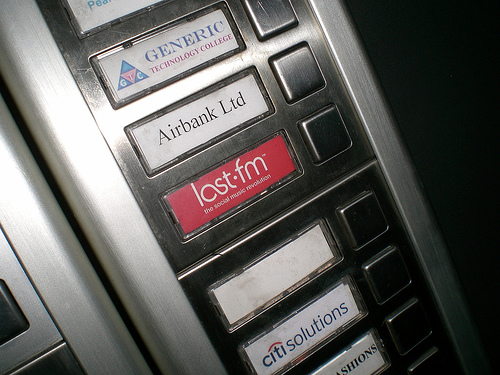Screw it, let's do it

Martin Stiksel is a quiet man. He’s balding, dresses in the understated and almost scruffy casual wear of young London companies. He speaks quietly with an Austrian accent, and smiles a lot. He’s a very nice chap.
I had a public argument with him once. But he warmly greets me whenever I see him: whether at his offices in trendy North London, or at conferences. Softly chiding me for using his services in ways he didn’t forsee and doesn’t altogether approve of; asking for, and sharing, information about our businesses; thoughtfully thinking about my answers.
As of this week, Martin is also a multi-millionaire: £19m came his way this week in a new personal fortune, courtesy of US broadcaster CBS, when they bought the company he founded with Felix Miller and Richard Jones. That company, launched in 2002 and now with fifteen million users, is the music website last.fm.
Of everything that’s been written about last.fm’s sale, one point has been missed, apparently: the not insubstantial point that the company has made it’s fortune by not playing by the rules.
Commercial radio doesn’t have “listen again”, the main point of the impressive BBC Radio Player. If you’re a fan of The Geoff Show, you can only listen to the podcast, and not the entire show, music and all. And, that’s been the case with virtually every single commercial radio station. There’s no licence arranged with the RadioCentre, unlike with podcasting, so therefore it’s difficult and arguably even impossible for each radio company to pursue a separate deal. And, because there is no deal, there’s no way to “listen again” to the wealth and breadth of commercial radio output - leaving that to the BBC to exploit. This isn’t through lack of trying, I should add.
What’s possibly rather surprising is that last.fm also has no such deal. Sure, they recently - very recently - signed a few deals with Warner and EMI, but most of what you hear on last.fm’s jukebox music services is not apparently licenced. Again, last.fm has been trying to get a blanket deal for a long while, but not managed to get the likes of PPL to agree. They’ve built their business on telling the record companies to go away and come back with a deal that makes sense; and producing their service anyway. A business that, this week, was worth £142m.
So: commercial radio couldn’t get a licence, so didn’t launch new services. last.fm couldn’t get a licence, but launched anyway, and built a great business.
It’s slightly irritating if you follow the rules and pay many millions of pounds to record companies, that the record companies appear not to take action against services like last.fm - and allow them to produce a great business while ignoring the rules. Copyright payments aren’t on the basis of an honesty tax; and concerning that the record companies see them that way. There’s no legal argument for witholding payment; there’s certainly a moral one.
I note that one station has quietly launched ‘listen-again’ services within their radio player, despite the lack of a RadioCentre-brokered deal. Could be that someone else is thinking the last.fm way too. Wonder what the record companies will do?
At the beginning of this, I mentioned I’d had a public argument with my newly-minted acquaintance. I asked him, in a Guardian conference in 2005 (three years after he launched), what music deals he’d signed. He replied to say he had not signed any deal with the record companies. I asked him whether that made him a glorified pirate radio station. Probably not the fairest of questions - but perhaps quite truthful. He quietly shrugged.